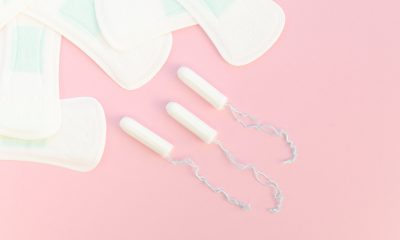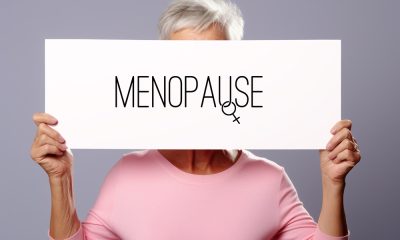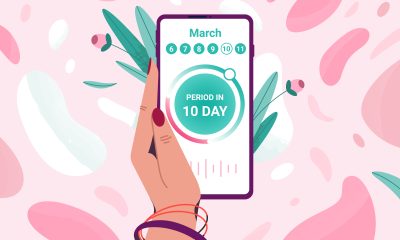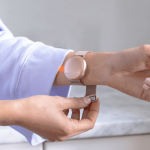Opinion
The intersection of femtech and mental health
By Gloria Kolb, Co-founder & CEO – Elitone

In recent years, Femtech has emerged as a powerful force in addressing women’s unique healthcare needs.
From fertility tracking to menopause management, these technologies are designed to provide solutions that make women’s lives easier, healthier, and more empowered.
However, one area that remains critically under-discussed in both Femtech and women’s health conversations is the intersection of mental health and incontinence.
Though often viewed as a purely physical issue, incontinence (uncontrolled bladder leakage) can have significant mental health consequences that, when combined with the pressures of modern life, can affect a woman’s overall well-being, focus, and self-esteem.
Femtech solutions must take a holistic approach to women’s health, addressing the physical, emotional, and mental challenges that conditions like incontinence present.
Incontinence and the strain on mental health
Many women rely on willpower to improve their health, whether that means eating better, managing stress, or staying focused at work.
However, incontinence presents a unique challenge, as it can erode that very willpower and focus.
The connection between mental health, willpower, and physical symptoms like incontinence is more significant than many realize.
For example, willpower depletion suggests that mental energy and focus are limited resources.
Once depleted, it becomes harder to maintain discipline and focus on tasks, whether it’s resisting certain foods, staying productive at work, or controlling emotional reactions.
Studies also show that willpower and focus are deeply interconnected.
When a woman is dealing with incontinence, the constant worry about leaking or embarrassing situations can take up mental bandwidth, which diminishes her ability to concentrate on other vital areas of her life, such as her job or personal goals.
For instance, a survey by the National Institute of Health found many working women experienced some form of leaking at work, and 88 per cent of those with more severe symptoms reported that it negatively impacted their self-confidence, concentration, and performance.
These statistics reveal that incontinence is not just a physical issue but a psychological one that profoundly affects a woman’s daily functioning and mental well-being.
Many women experiencing incontinence report feelings of embarrassment, frustration, and even shame.
This emotional toll can lead to anxiety and depression, especially if the condition goes untreated for extended periods.
It becomes a vicious cycle — worrying about incontinence lowers concentration and self-esteem, which can increase feelings of stress, making the symptoms even worse.
She then has less mental capacity to focus on work or other personal goals, and her ability to exert willpower in other areas, such as avoiding unhealthy food or exercising, diminishes.
While the mental health aspect of incontinence is unfortunately often overlooked in favor of focusing purely on physical treatment, addressing both aspects is crucial for long-term success.
Women need a holistic solution that treats the physical symptoms and helps them regain their focus, confidence, and willpower.
Femtech’s role in addressing mental health and incontinence
This is where Femtech can play a transformative role.
For example, some Femtech platforms incorporate mental health tracking into their offerings, allowing women to monitor their emotional states alongside their physical symptoms.
These platforms can provide stress management techniques, cognitive behavioral therapy tools, and even mindfulness exercises aimed at reducing anxiety around conditions like fertility and incontinence.
In other examples, addressing the root cause of the stressors or putting perspectives around the issue can alleviate some emotional burdens.
For example, when some women understand how common incontinence is and that 1 in 3 women are in the same situation, then embarrassment, blame, and helplessness may be lessened.
Moreover, by providing women with real-time data on their condition, these technologies may help reduce uncertainty and anxiety by recognising where it is coming from, putting perspectives around it, giving practical tips, and thereby offering some control.
When a woman feels more in control of her health, she can better focus on other areas of life, such as her work, family, and personal relationships or goals.
This empowerment is critical to boosting mental resilience and restoring the balance between willpower and focus.
The impact of mental health support on women’s health
Integrating mental health support into women’s health solutions offers numerous benefits.
By addressing both the psychological and physical aspects of conditions like incontinence, women can achieve better overall outcomes.
This has been a trend in the clinic. OB/GYNs no longer address only birthing and gynecological solutions but have become the de facto primary care for women, as evidenced by the latest ACOG conference.
They are being educated on everything from head to toe that pertains to women, including mental health.
In fact, some mental issues, such as depression, affect women twice as much as men.
Part of this is hormonal, heightened by the changes due to menstruation, pregnancy, and menopause.
But I would add that there is a higher emotional burden on women due to managing their homes, including the financial and emotional well-being of their children.
Additionally, Femtech solutions that encourage women to engage in self-care practices can help combat the feelings of shame and isolation that often accompany conditions like incontinence.
Women are more likely to seek out treatment and stick with their treatment plans when they feel supported emotionally, which can lead to faster recovery and better quality of life.
Mental health support in Femtech also opens the door for more meaningful conversations between women and their healthcare providers.
When a woman is equipped with data about her mental and physical health, she can have a more informed and productive discussion with her doctor, leading to more personalised care and a feeling of being heard.
The future of femtech and mental health
Addressing the mental health impact of conditions like incontinence is not just an added benefit — it’s a necessity.
Femtech solutions that integrate mental health support, whether integrated into the device, more education, email, or community support, provide women with the tools to manage their physical symptoms and emotional well-being.
As we look to the future of women’s health, it’s clear that a holistic, patient-centered approach will pave the way for more effective treatments and better outcomes.
Gloria Kolb is the CEO and co-founder of Elitone, the first non-invasive, FDA-cleared, wearable treatment for women with urinary incontinence.
Elitone’s accolades include winning Best New Product by My Face My Body, Sling Shot 2020, finalist in the Women Startup Challenge, and many startup pitch competitions.
As an inventor with 30+ patents, Gloria has been featured in Forbes as a Top Scientist Driving Innovation in Women’s Health.
Her creative designs and problem-solving abilities have earned her recognition, such as Boston’s “40 Under 40” and MIT Review’s “World’s Top Innovators under 35.” She has engineering degrees from MIT and Stanford and an MBA in entrepreneurship from Babson College.
Opinion
Women’s health is not niche: It’s the future of healthcare

By Melissa Wallace, CEO & Founding Partner of Fierce Foundry
Just a few years ago, so many conversations around women’s health in the U.S. felt like they were still just making the case for why investment mattered. Panels, white papers, TED-style talks pointed to under-funding, data gaps, structural bias. But something has shifted. Across healthcare and investment communities, the tone now is more about when, not if, and increasingly how.
A compelling indicator of this shift arrived in early August, when the Gates Foundation announced a $2.5 billion commitment to advance women’s health research and development through 2030, fixing its spotlight on long-neglected areas such as menopause, heavy menstrual bleeding and endometriosis. (Reuters) Paired with this, industry commentary emphasises that med-tech devices specifically for women are gaining investor interest at a notable pace. (Medical Device Network)
This sort of capital commitment and investor signal was rare even just a couple of years ago, it underscores a rising belief that women’s health is not just a moral imperative, but a strong market opportunity with measurable returns.
The momentum is palpable here in the U.S.: deficits in research and care persist (for example, women’s health startups captured a record ~$2.6 billion in venture funding in 2024, up from ~$1.7 billion in 2023). (BioPharmadive) And while the sector remains under‐capitalized overall (some reports suggest only ~2% of healthcare investment goes to women’s‐health solutions) (Morgan Lewis) the trajectory is unmistakable.
What’s causing the flip?
- From niche to mainstream: The definition of “women’s health” is expanding in the U.S. It’s no longer just fertility or gynecology, it now encompasses perimenopause, longevity, autoimmune conditions, cardiovascular issues in women. “We’re finally seeing women’s health shift from the under-invested side-line to an innovation category that VCs believe can outperform,” said Raysa Bousleiman, Senior VP for Investor Coverage at Silicon Valley Bank.
- Data gaps turning into data opportunity: For decades, women’s biology, hormonal cycles, mid-life transitions were under-researched. That created both risk and opportunity. Today, tools such as AI, advanced imaging and genomics are closing those gaps. One insightful analysis argued that AI could fundamentally reshape women’s health by tackling “data deserts, bias, and gaps.” (World Economic Forum) Investors increasingly see that the business case is real, not just the moral one. The report “The WHAM Report” frames women’s health investment as “a pathway to societal impact, economic resilience and sustainable growth.”(Wham Now)
- Exit and scale signals: The proof of performance is emerging. In the U.S., scale players are projecting women’s health lines hitting milestone revenues. In Europe, a company raised hundreds of millions targeting ovarian cancer and perimenopause. These “top-of-the-chain” moves may feel distant to early-stage founders, but they shift perception fundamentally: women’s health is not a boutique play, it’s investable, scalable, strategic.
- Shift in investor mindset: No longer is women’s health simply a “good cause”; it’s a growth category. Fund managers are citing track records, asking to raise dedicated funds, deploying dollars not just to be socially responsible but to achieve outsized returns. That shift changes how founders engage, what boards expect, what exits look like.
Still, we must be candid: founders in this space continue to face headwinds. For example, one founder, Valentina Milanova of Daye, shared the frustrating anecdote: “I’ve had investors ask me why our tampons have string on them.” That kind of query signals bias, not just about product design, but about the perceived seriousness of the category. Her pragmatic advice to early-stage founders: consider grant funding, especially in Europe, as founder-friendly capital that can help bridge to private investment.
What does this all mean for U.S. organizations and the broader ecosystem?
For healthcare organizations: The signals are clear. Women’s health is moving from underserved niche to strategic priority. In the U.S., institutions and health systems that double-down here now may gain first-mover advantage, whether by building multidisciplinary women’s health centres, partnering with innovative startups, or harnessing data insights tailored for women. The business case is sharper than ever: women make up 51 % of the population, drive ~80 % of healthcare decisions, and still face care gaps. (Wham Now)
For investors and founders: This is a moment. The conversation is no longer simply “why invest in women’s health” but “how to invest in women’s health at scale”. Founders should be ready to show performance, not just potential. Investors should demand sex-disaggregated data, metrics beyond fertility, and a broader view of women’s life-course care. The heavy lifting remains but it’s now being valued.
For the market at large: The under-served areas are many perimenopause, mid-life wellness, autoimmune conditions in women, hair loss, anorectal care, longevity for women, all of which were once sidelined. That white space, combined with rising capital and broader recognition, fuels a powerful market dynamic.
The story of women’s health is being rewritten. Where once the conversation focused on why, today it increasingly focuses on how. The category is shifting toward performance, scale, credibility. For healthcare organizations willing to commit whether via partnerships, internal innovation or capital deployment, this is not just a mission. It’s a strategic opportunity. And the message is resonating: women’s health is not an afterthought anymore. It’s one of the fastest-growing, most under-leveraged frontiers in healthcare.
News
Listening to pain: What eight women taught me about the state of women’s health in the UK

By Ruby Raut, founder & CEO, WUKA
It’s Ruby here, founder of WUKA and, like many of you, someone who’s been dismissed, doubted, and left waiting far too long when it comes to menstrual health.
Last week, I spoke at an event hosted by the Menstrual Health Project. It wasn’t just another panel or pitch session; it was a wake-up call.
The room was filled with GPs, pharmacists, educators, innovators, and women who have lived the daily reality of conditions like endometriosis, PCOS, PMDD, and premature ovarian insufficiency.
We weren’t there to celebrate solutions. We were there to listen. And what we heard broke us open.
The Stories Behind the Statistics
I walked out of that room with one page of notes — not data, not theory, but pain in ink.
The stories were raw and repetitive. Women told us of:
- 14 years of seeking help and getting none.
- 3 decades of living in pain.
- Being laughed at for wanting to come off contraception.
- Being told to “just go on the pill.”
- Waiting for a laparoscopy since 2015, and still waiting in 2025.
- Being asked to gain weight to get a period or lose weight to manage PCOS.
- Being offered pregnancy as a “solution.”
- Losing jobs because of endometriosis.
This is not an isolated list of frustrations. It’s a mirror reflecting the state of women’s health in the UK today.
Behind every statistic, there’s a woman who has rearranged her life around pain, missed promotions, cancelled plans, and lost trust in her own body.

The System Is Failing Us, and We Know It
Hearing these stories, I couldn’t help but think of it like a leaking roof.
You notice the drip, you report it, but you’re told it’s nothing serious, to just wait it out.
Days turn into months, months into years. By the time someone finally takes a proper look, the ceiling has collapsed.
That’s what living with an untreated women’s health condition feels like, small symptoms dismissed until they become impossible to ignore. That’s what our healthcare system is doing to women.
We don’t have a lack of data, we have a lack of listening.
When women describe pain, the system translates it into exaggeration. When they ask for options, they get the same recycled advice: “Go on the pill.”
The medical model still treats menstruation as a niche, not a vital sign.
And that’s why listening matters. Because until we treat lived experience as evidence, we’ll keep designing systems that ignore reality.
Learning from Lived Experience
As founders, practitioners, and advocates, we often talk about innovation, new tech, better diagnostics, smarter apps. But innovation without empathy is just noise.
Listening to eight women share their stories of endometriosis, PCOS, and PMDD reminded me of something fundamental: we can’t fix what we refuse to feel.
It takes courage to speak about periods, pain, infertility, and loss in a room full of professionals.
Yet these women did, not because they wanted sympathy, but because they wanted change.
Their words carried a collective message: “We don’t need to be fixed, we need to be heard.”
The Change We Need
So, what would change actually look like?
- Menstrual health education in medical schools.
Not as a module, but as a mainstream subject. Every GP, nurse, and specialist should understand menstrual health the way they understand blood pressure. - Inclusive menopause and menstrual support, for all ages, all bodies.
Menstrual and menopausal health should not be separate conversations. Hormonal health spans a lifetime. - Accessible care at every level.
Support should start at the local pharmacy, not five years into a diagnosis journey. Pharmacists and primary care teams can be the first line of empathy and intervention. - Private and public health insurance that covers menstrual conditions.
No woman should have to choose between financial stability and pain management. - Policy change that protects and respects women’s health.
We need national recognition that menstrual health is not a luxury — it’s a basic human right.
What Listening Really Means
Listening is not passive. It’s radical.
It means staying in the discomfort of someone else’s pain long enough to see the system that caused it. It means asking, not assuming. It means holding space before we offer solutions.
The Menstrual Health Project event reminded me that we can’t rely on numbers alone. Data gives us proof. Stories give us purpose. And when you combine both, that’s when transformation begins.

Why WUKA Cares
At WUKA, we started with period underwear, but what we’re really building is period equity.
Every conversation, campaign, and product we create is rooted in one belief: women deserve better.
Better care. Better education. Better respect.
Because menstrual health is not a side issue. It’s a social justice issue. It’s about the right to live without shame, without silence, and without suffering that’s dismissed as “normal.”
If you’re someone living with any of this, endometriosis, PCOS, PMDD, or anything that makes you feel unseen, I see you. You are not alone. You deserve better, and we will keep fighting for you.
Let’s listen louder. Let’s care deeper. Let’s make menstrual health mainstream.
With you always,
Ruby x
Founder & CEO, WUKA
P.S. Check out the incredible work of the Menstrual Health Project. They’re not just raising awareness, they’re rebuilding the narrative.
Fertility
Why gestational diabetes underdiagnosis is a women’s health crisis

By James Jackson, CEO at Digostics
Gestational diabetes (GDM) is one of the most under-recognised challenges in maternity care today.
Despite affecting around one in five pregnancies in the UK, GDM remains a blind spot in policy and practice, with devastating consequences for women and their children.
New research continues to expose the scale of the problem.
A recent NIHR-funded study published in Diabetic Medicine found that standard NHS testing methods miss over 50 per cent of cases.
Put simply: thousands of women each year go undiagnosed, untreated, and exposed to avoidable risks.
For a condition we know how to diagnose and manage, this represents a serious failure in women’s healthcare.
The human cost of missed diagnosis
When gestational diabetes is not picked up, the consequences are immediate and long-term.
During pregnancy, women face higher risks of preeclampsia, larger babies, emergency C-sections, and stillbirth. Babies are more likely to need neonatal intensive care due to breathing difficulties or low blood sugar.
The risks don’t end at birth.
Mothers who have had GDM are up to 50 per cent more likely to develop type 2 diabetes within 5–10 years. Their children also face an increased lifetime risk of obesity and diabetes.
These outcomes are not rare, nor are they inevitable. They are the product of a testing system that is not fit for purpose.
An unequal system
Current UK pathways rely on risk-factor–based screening rather than universal testing.

James Jackson
This already puts women at a disadvantage compared with countries such as Spain, Italy, and many others, where all pregnant women are routinely screened.
But even within this narrower approach, the NHS faces a further problem: in-clinic oral glucose tolerance tests (OGTTs), used to test for GDM, are prone to delays in blood sample processing, leading to false negatives.
Research shows that when samples are processed correctly diagnoses increase from 9 per cent to 22 per cent — more than double.
The burden of this diagnostic failure falls hardest on women from disadvantaged backgrounds.
Attending early-morning, hospital-based tests is more difficult for women juggling shift work, childcare, or long travel times.
Women from ethnic minority groups, who already face higher rates of maternal complications, are also more likely to be missed. In this way, testing failures are not just a clinical problem but a driver of health inequalities.
The case for innovation
This is where innovation can play a transformative role.
We have seen in other areas of healthcare — from remote monitoring to home blood pressure checks — how new approaches can increase accuracy, improve access, and reduce inequalities.
Gestational diabetes testing should be no different. Technologies such as at-home oral glucose tolerance tests (OGTTs) are designed to meet the same clinical standards as hospital testing, while overcoming the practical barriers of travel, fasting, and sample degradation.
By enabling women to test from home, results can be processed immediately and shared directly with care teams, reducing missed cases and ensuring timely diagnosis.
Early work with NHS Trusts has already shown that this model not only identifies more cases but also improves access for diverse patient groups, including those typically underserved.
From evidence to action
Despite clear data, progress has been slow. Part of the challenge is that more accurate testing uncovers more cases — and more cases mean more workload for already stretched maternity services.
But failing to diagnose does not make the problem go away; it only delays care and worsens outcomes.
In the long run, undiagnosed gestational diabetes costs the NHS more through emergency interventions, neonatal intensive care, later-life type 2 diabetes, and the ongoing workload and cost pressures this creates for primary care.
The evidence is clear. Now it must translate into policy. That means:
- Recognising underdiagnosis as a patient safety issue on par with other maternity scandals.
- Guaranteeing that all women offered testing receive accurate, reliable results, rather than being failed by flawed processes.
- Supporting innovation that improves accuracy and equity, whether in the clinic or at home.
- Embedding the patient voice in service design, especially from women in disadvantaged and minority communities most affected by current failures.
A call to prioritise women’s health
Gestational diabetes is not a niche concern; it is a mainstream women’s health issue with lifelong consequences.
Every undiagnosed case represents not just a missed number, but a mother at risk of preeclampsia or birth trauma, a baby at risk of intensive care, or a family facing preventable illness later in life.
As maternity services undergo yet another review, it is striking that the diagnostic gap in GDM remains so little discussed.
We cannot claim to be serious about women’s health while ignoring one of the most widespread and preventable sources of harm in pregnancy.
Innovation has a role to play — but innovation must be matched by policy will.
If we are to modernise maternity care, we must start by ensuring that every woman has access to accurate, timely, and equitable testing for gestational diabetes.
Because every mother deserves certainty. And every baby deserves the best start in life.

 News3 days ago
News3 days agoDozens of women report suffering painful burns after using Always sanitary towels

 Menopause3 weeks ago
Menopause3 weeks agoFDA plans to revise black box warning on menopause hormone therapies

 News2 weeks ago
News2 weeks agoAI-powered women’s health companion Nexus launches in UK

 Wellness1 week ago
Wellness1 week agoWomen’s health innovations recognised in TIME’s Best Inventions 2025

 Fertility3 weeks ago
Fertility3 weeks agoScientists turn human skin cells into eggs in IVF breakthrough

 News3 weeks ago
News3 weeks agoDaily pill could delay menopause ‘by years,’ study finds

 News2 weeks ago
News2 weeks agoAncient herb to modern must-have: Why ashwagandha is capturing UK women’s attention

 News2 weeks ago
News2 weeks agoMenstrual cycle affects women’s reaction time, study finds




























